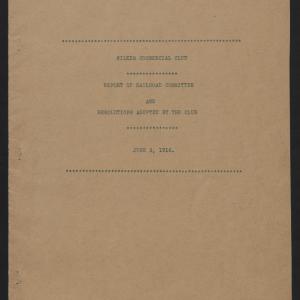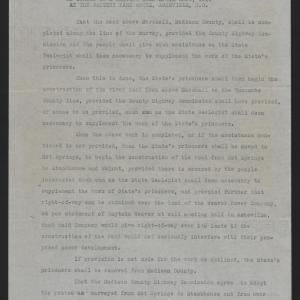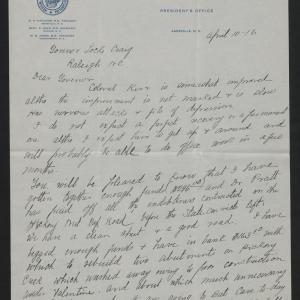- Transcription
SOUTHERN GOOD ROADS
LEXINGTON, NORTH CAROLINA
June seventeenth,
Nineteen-Thirteen.1
Governor Locke Craig,
Asheville, N.C.
Dear Governor Craig:
I am sorry that I could not stay over and see you while In Asheville last Wednesday night. Only by making every train and losing no time we got through visiting the railroad camps in western North Carolina Saturday afternoon.
I am more impressed than ever before with the ridiculousness of giving away the labor of the state's convicts to private corporations. There is absolutely nothing to the South Atlantic Transcontinental Railroad. It is purely a bare-faced fraud, and the state is doing an immoral act in giving aid to such a proposition.
The Statesville Air Line proposition, in my opinion, is purely a case of speculation and promotion, and I don't blame the men who are back of it for using the state. The state is furnishing convicts, boarding, clothing and guarding them, and they have graded something like ten miles of railroad. It is just a question of time until these gentlemen will sell out. We ought not to be aiding that proposition.
We investigated the Watauga Railway, which is being built from North Wilkesboro to Grandin City, and trains are running on this road. This is purely a lumber proposition, as the parties who own the road own 68,000 acres of fine timber land. They have built this road through their timber land and they have stopped all work on the road except what is being done by the convicts. These people are making considerable development for their own good, and at the same time they are helping the community through which they run, but I have no idea that they ever expect to go to Watauga county, unless the state furnishes the convicts to build the road. It is not a worthy proposition. In other words, the principle is absolutely wrong. If these men are entitled to convicts to develop their property, being foreigners, I see no reason why a company of citizens of Davidson county would not be entitled to fifty convicts to develop a timber proposition, and I am sure that I could get these men to make a large contribution to the Democratic campaign fund each year in consideration of this fact.
We visited the camp of the Elkin & Alleghany Railway. This is the most worthy proposition of all of them. They are building a railroad and are going to develop a fine section of country. The Chathams, Governor Doughton and other friends have invested considerable money in it and they are running a regular schedule, and when the road is completed it will be worth a great deal to that section of the state, which is one of the finest sections in North Carolina. If that road is build the Watauga Railway will never be built. Both of these roads are not needed. The Elkin & Alleghany is being financed by Lismen & Company of New York, and they are going right ahead with the work, but we have no assurance that the stock we are receiving in payment for the convicts' work will ever be worth 5 cents to the state. Convicts ought to be taken off of all these roads, or the stock held in these roads by the state ought to be guaranteed and properly protected, so that it cannot be mortgaged and sold. If we can't make arrangements to have this stock properly guaranteed and protected, why the whole business should fail, because, as the matter now stands, we have in the State Treasury $242,825.52 in stock that we call an asset, which is absolutely worthless and is a fraud on its face.
We are losing by this arrangement $107,400 per year, enough to do wonderful things in real development in North Carolina. It is about the rottenest proposition I have ever investigated, and it is a wonder to me that if the entire state government is run on the same basis that we are not absolutely bankrupt.
I am very much interested in seeing these matters corrected, and I want to do what you want done. If we have authority we would like to use it; if we haven't got authority, this matter ought to be made public, so that the next Legislature will give us authority, because it is an injustice to the people of North Carolina. I would like to have you write me and tell me what to do.
Pardon me for writing you this letter, but I felt like you ought to know something of what I thought about things after making the investigation.
Very truly yours,
HBV-H
1. Though stamped "answered" on June 18, 1913, the governor's response was not found among his papers.







